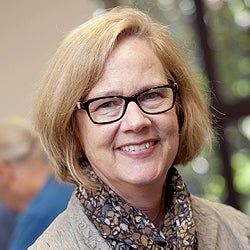Every week, about 20 people living with Parkinson’s disease spend an hour with Leslie Mahler, Associate Professor of Communicative Disorders, and her graduate students in a clinical support group aimed at helping the patients overcome the speech disorders that typically result from the disease. Dubbed the Loud Crowd, they work on strategies to correct their slurred or monotone speech, breathy or hoarse voice, and reduced vocal volume, all of which result from underlying neural mechanisms.
The program is just one of several that Professor Mahler leads to address communication issues that arise from neurological disorders. “I study treatments that help people speak more clearly,” she said. “Our behavioral treatments incorporate principles of motor learning to drive changes in neuroplasticity. We want to change not only speech behaviors, but also how the brain controls those behaviors.”
A member of the Governor’s Advisory Commission on Traumatic Brain Injury, Professor Mahler spent 23 years working as a speech pathologist in a hospital before coming to URI in 2007. Here, she continues to specialize in treatments for people with Parkinson’s, brain injury, Down syndrome and stroke. She wrote the first research paper ever published about treating speech disorders in adults with Down syndrome, and one of her most important contributions has been to identify that those in the chronic stages of disease can still benefit from speech therapy.
Every week, Professor Mahler leverages her clinical experience with her expertise in treatment efficacy research to provide unique experiential learning opportunities for her students and effective treatment to members of the community that would not otherwise be available. A key principle of effective treatment, she says, is intensity of practice. “Once or twice a week isn’t enough. My treatments are four days a week for six weeks. That’s a big commitment, but it works.”
Going forward, Professor Mahler’s research will contribute to the work of URI’s new George & Anne Ryan Institute for Neuroscience, which will bring even more funding and focus to the important area of neurodegenerative disorders, and hopefully lead to a breakthrough that will transform the lives of the millions affected by neurological diseases every day.
Related Links:

